
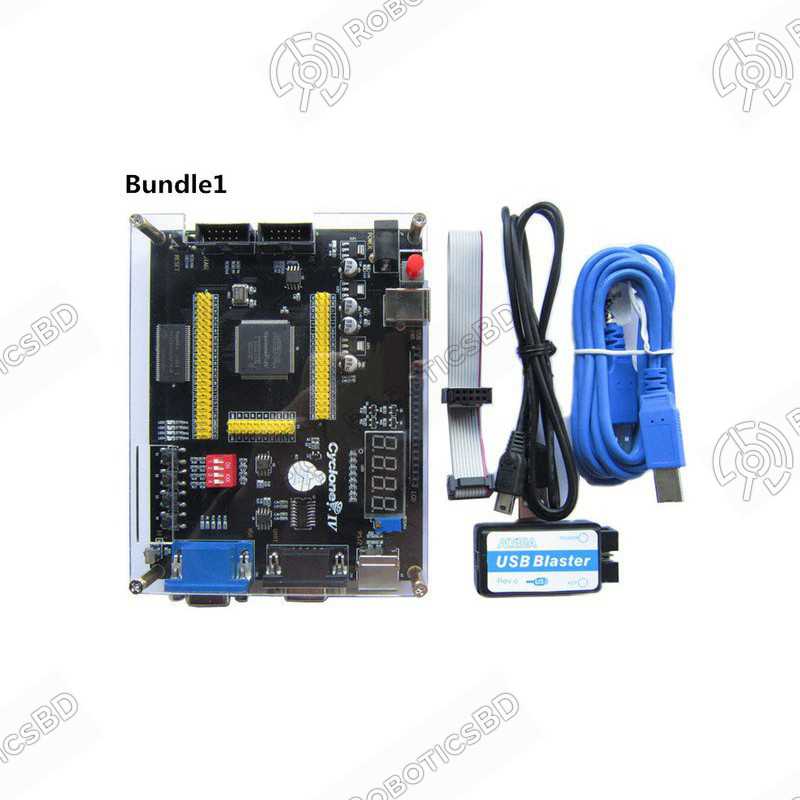



 Store Pickup Available!
Store Pickup Available!
 Free Ship Over 5000 BDT
Free Ship Over 5000 BDT
 Quality Product
Quality Product
 No Warranty
No Warranty
 No Replacement
No Replacement
Altera Cyclone IV EP4CE6 FPGA Development Board NIOSII EP4CE PCB and USB Blaster Jtag AS Programmer. Featured By RoboticsBD.
This is an all-new development board based on EP4CE10 FPGA. The ALTERA Cyclone IV EP4CE6 FPGA Development Board extends the cyclone FPGA series leadership in providing the market’s lowest cost, lowest power FPGAs, now with a transceiver variant. Cyclone IV devices are targeted to high-volume, cost-sensitive applications, enabling system designers to meet increasing bandwidth requirements while lowering costs. Featured By RoboticsBD.
Providing power and cost savings without sacrificing performance, along with a low-cost integrated transceiver option, Cyclone IV devices are ideal for low-cost, small-form-factor applications in the wireless, wireline, broadcast, industrial, consumer, and communications industries. Featured By RoboticsBD.
Product Images are shown for illustrative purposes only and may differ from the actual product.
RoboticsBD RoboticsBD RoboticsBD RoboticsBD RoboticsBD RoboticsBD RoboticsBD RoboticsBD RoboticsBD RoboticsBD
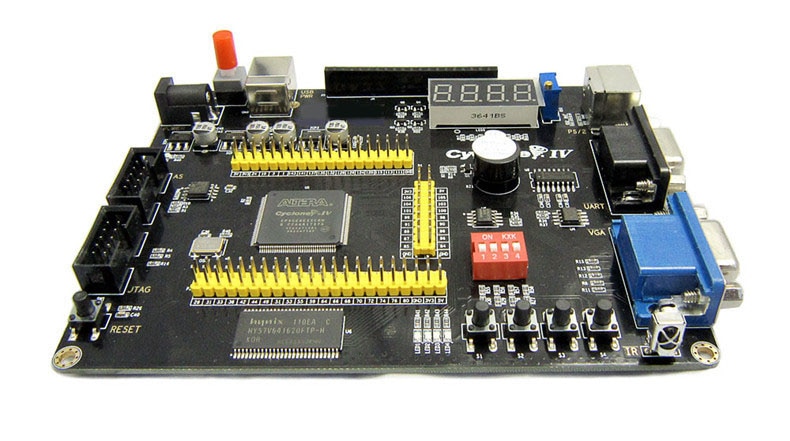
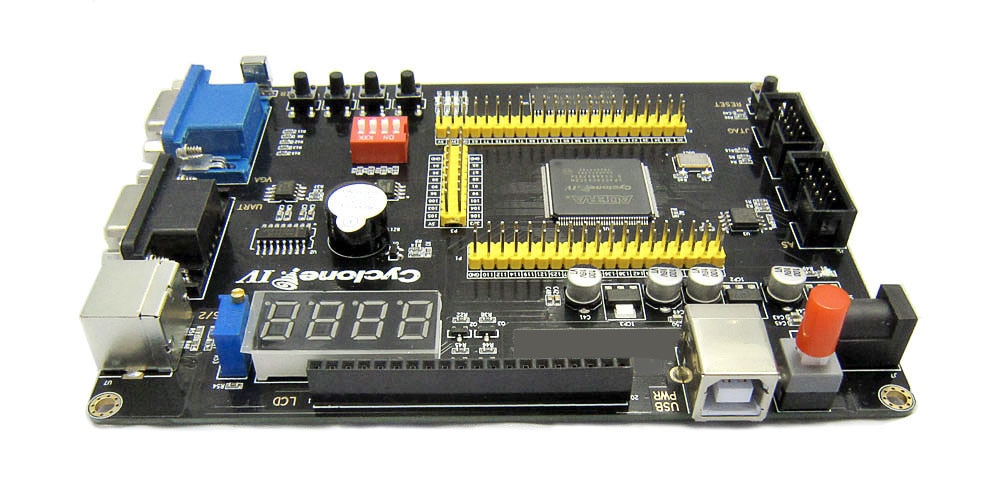
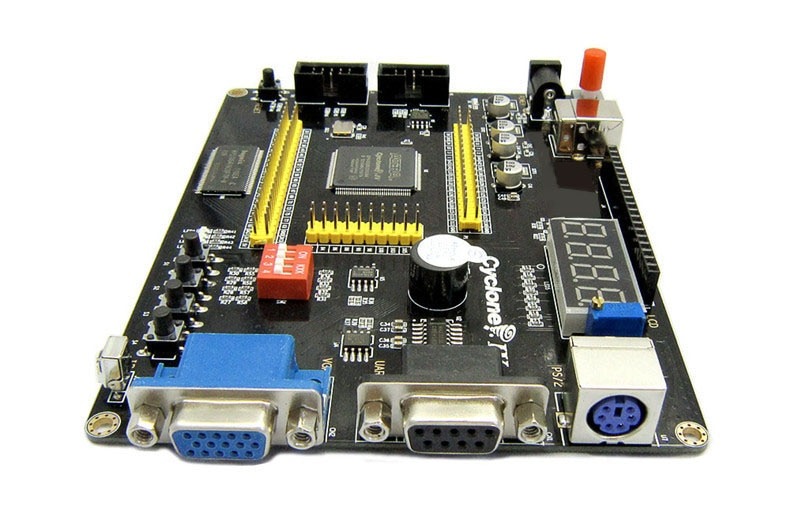
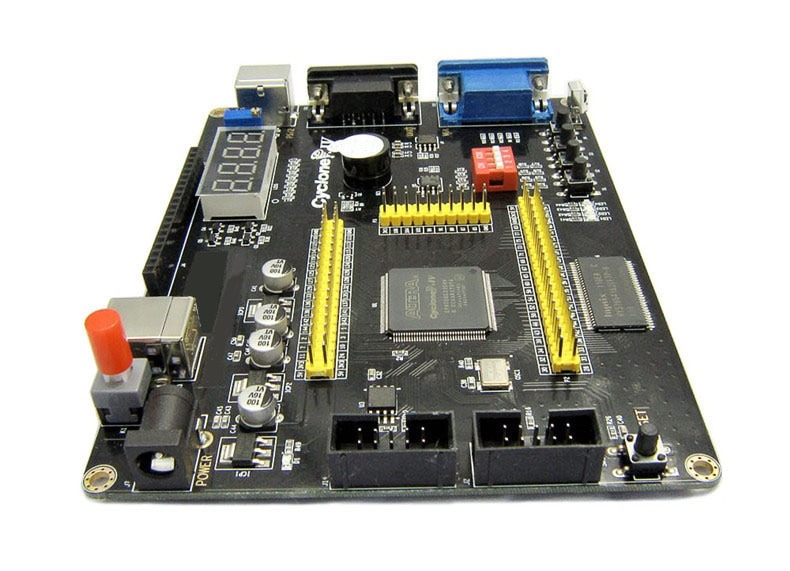
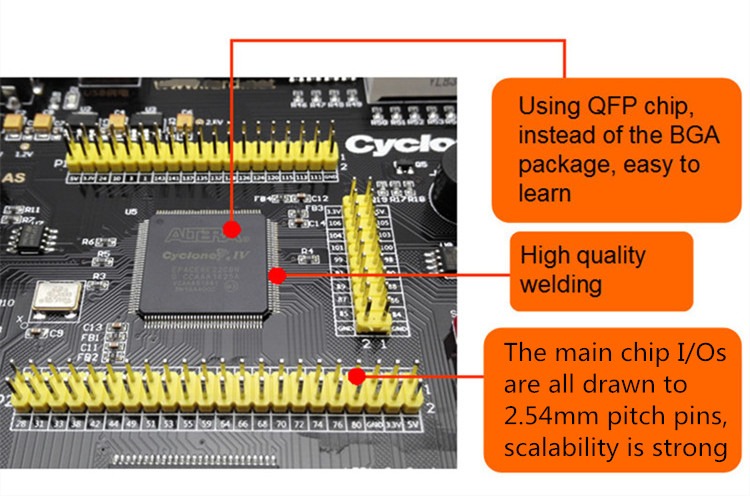
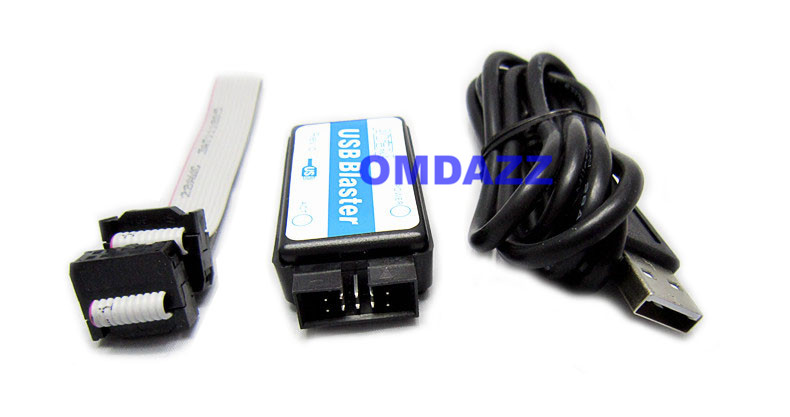
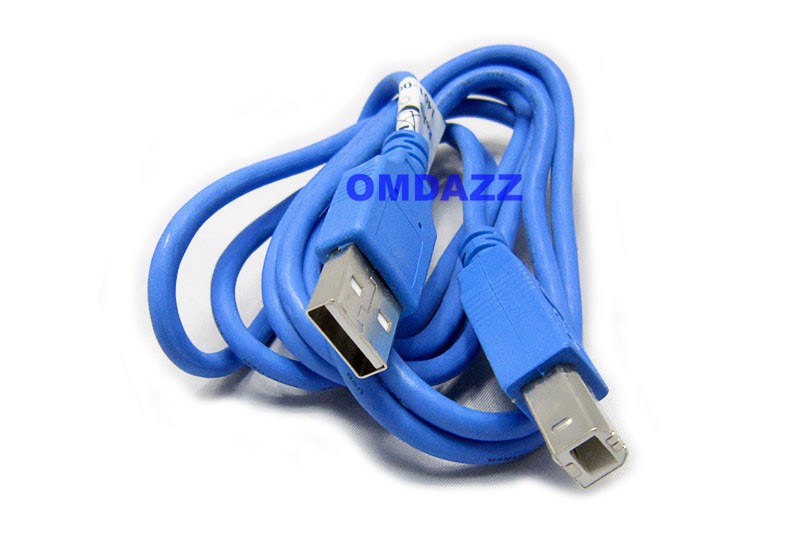
RoboticsBD RoboticsBD RoboticsBD RoboticsBD RoboticsBD RoboticsBD RoboticsBD RoboticsBD RoboticsBD RoboticsBD
| General Specification | |
| Main chip | ALTERA Cyclone IV EP4CE6E22C8N. |
| Memory configuration | The board with 16Mbit EPCS16N serial configuration chip, the user can download and debug the program code via JTAG interface or AS interface. |
| Memory configuration | The board with 64Mbit SDRAM, support SOPC, NIOSII development. |
| The voltage regulator chip | Using 1117-3.3V voltage regulator chip, to provide 3.3V voltage output. |
| The voltage regulator chip | Using 1117-1.2V voltage regulator chip to provide FPGA core voltage. |
| The voltage regulator chip | Using 1117-2.5V voltage regulator chip, to provide PLL voltage output. |
| Voltage input | DC 5V. The board also can be powered through the USB interface. |
| Program debug and download interface | JTAG interface: download .SOF file, the speed is fast. No loss of data after power failure. |
| AS interface | Download .POF file. No loss of data after power failure. |
| Expansion interface | Leads to all pins of the main chip, 2.54mm spacing. |
| Size: | 136mm x 106mm |
| Shipment Weight | 0.326 kg |
| Shipment Dimensions | 15 × 15 × 7.5 cm |
Please allow 5% measuring deviation due to manual measurement.
RoboticsBD RoboticsBD RoboticsBD RoboticsBD RoboticsBD RoboticsBD RoboticsBD RoboticsBD RoboticsBD RoboticsBD
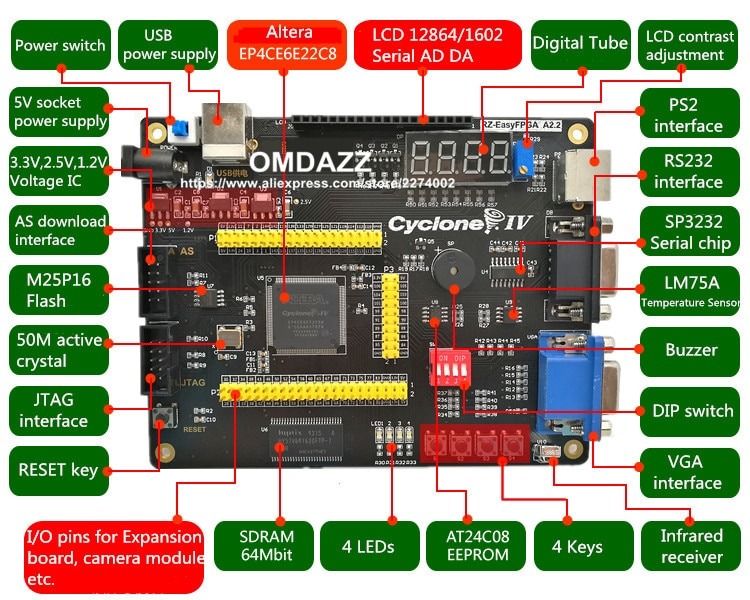
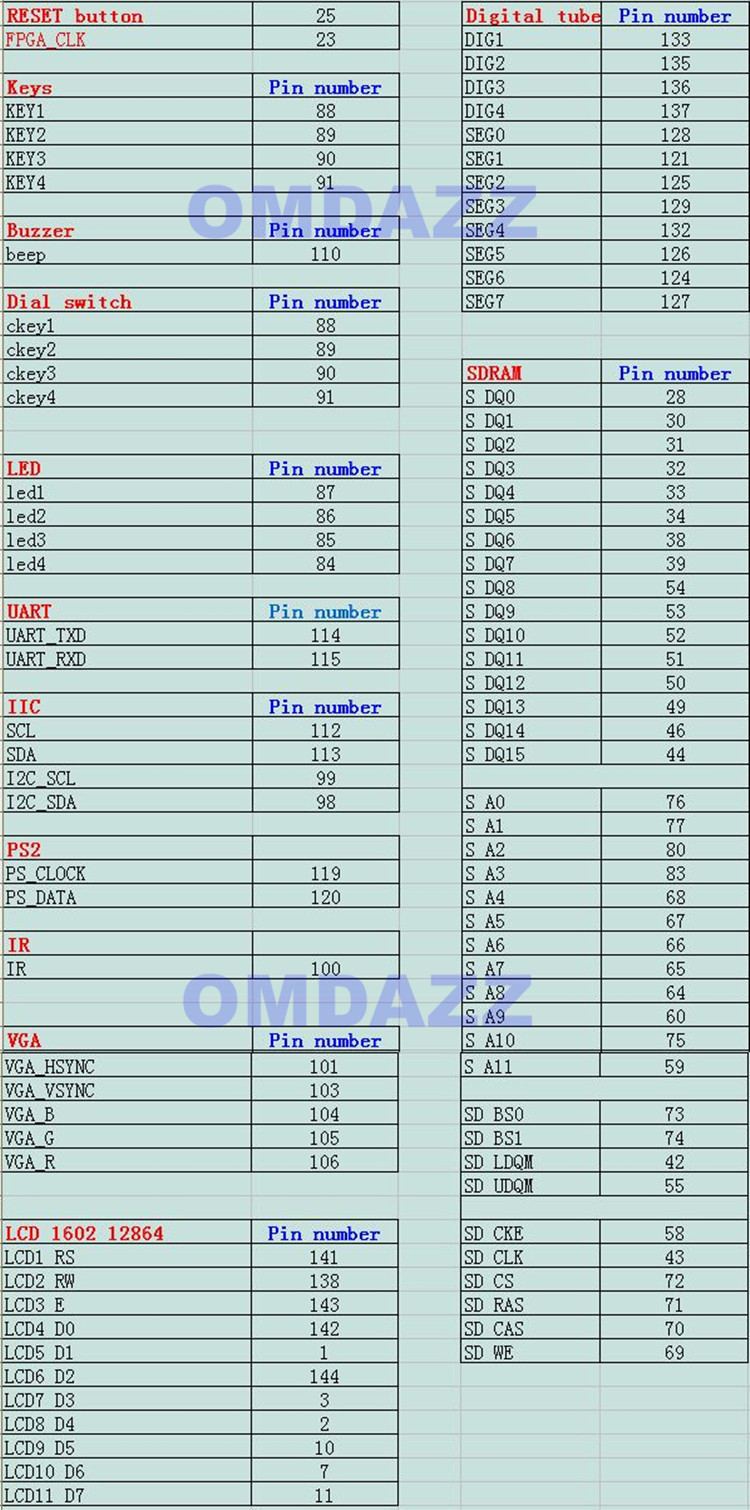
1 x Altera Cyclone IV EP4CE6 FPGA Development Board NIOSII EP4CE PCB and USB Blaster Jtag AS Programmer.
RoboticsBD RoboticsBD RoboticsBD RoboticsBD RoboticsBD RoboticsBD RoboticsBD RoboticsBD RoboticsBD RoboticsBD
RoboticsBD RoboticsBD RoboticsBD RoboticsBD RoboticsBD RoboticsBD RoboticsBD RoboticsBD RoboticsBD RoboticsBD
The latest price of Altera Cyclone IV EP4CE6 FPGA Development Board NIOSII EP4CE PCB and USB Blaster Jtag AS Programmer in Bangladesh is BDT 11,225 You can buy the Altera Cyclone IV EP4CE6 FPGA Development Board NIOSII EP4CE PCB and USB Blaster Jtag AS Programmer at best price from our RoboticsBD or visit RoboticsBD Office.
|
Please note that the product information provided on our website may not be entirely accurate as it is collected from various sources on the web. While we strive to provide the most up-to-date information possible, we cannot guarantee its accuracy. We recommend that you always read the product labels, warnings, and directions before using any product. |
|
Product Images are shown for illustrative purposes only and may differ from the actual product. |

Reference: RBD-1103
Stably support SignalTap II embedded logic analyzer function, no mistake while crawling data. Fully support all Altera products such as CPLD: MAX3000, MAX7000, MAX9000 and MAXII. FPGA: Stratix, StratixII, StratxIII, Cyclone, CycloneII, CycloneIII, ACEX1K, APEX20K and FLEX10K etc. Active serial configuration device: EPCS1, EPCS4, EPCS16, EPCS64 etc....
Reference: RBD-1807
Altera Cyclone IV FPGA EP4CE6E22C8N EP4CE6 Development Board
Reference: RBD-1830
FT245+CPLD High-Speed Program Altera USB Blaster Download Cable FPGA / CPLD Downloader
Reference: RBD-1402
The perfect solution for breaking out the pins from Lua V3 Nodemcu. Lead-out all the IO ports of the ESP-12E development board Lead out the pins of 5V and 3.3V power supply Convenient to connect with peripheral modules Onboard 5V / 1A DC-DC step-down converter circuit Onboard power indicator With DC power jack 6-24V.
Reference: RBD-2199
Compatible with the Arduino IDE, making it easy for beginners to start using Smaller and cheaper than traditional Arduino boards Powered by a 16.0 MHz microcontroller Fully assembled except for headers, allowing for easy soldering Great for projects where size and cost are a concern Perfect for beginners to jump into electronics Can be used for a variety...
Reference: RBD-1806
Based on ESP32 240MHz Xtensa dual-core 32-bit microprocessor Operating Voltage: 2.7V – 4.2V Working Current: 60mA Battery Charging Current: 500mA
Reference: RBD-1821
Open-source, Interactive, Programmable, Low cost, Simple, Smart, WI-FI enabled Arduino-like hardware IO Integrated TR switch, balun, LNA, power amplifier and matching network Integrated PLL, regulators, DCXO and power management units Onboard USB to serial chip to easily program and upload codes from the Arduino IDE Easy to use breadboard friendly form...
Reference: RBD-1875
Fully compatible with the PC. Moulded strain relief and PVC over moulding to ensure a lifetime of error-free data transmissions. Aluminium under mould shield helps meet FCC requirements on KMI/RFI interference. Foil and braid shield complies with fully rated cable specifications reducing EMI/FRI interference.
Reference: RBD-0094
The Arduino Uno R3 High-Quality Edition Arduino UNO in Bangladesh Micro-controller : ATmega328. Operating Voltage : 5V. Input Voltage (recommended) : 7-12V. Digital I/O Pins : 14 (of which 6 provide PWM output). Analog Input Pins : 6. The Arduino Uno R3 High-Quality Edition embodies superior craftsmanship and meticulous attention to detail, resulting in...
Reference: RBD-0155
Microcontroller: ATmega328 Circuit Operating Voltage: 5V Clock frequency: 16MHz. Digital I/O Pins: 14 8 analog input port: A0 ~ A7. A pair of TTL level serial port transceiver : RX / TX. 6 PWM port: D3, D5, D6, D9, D10, D11. Support serial download.
Reference: RBD-1809
Digispark Pro ATtiny167 Micro USB 16MHz
Reference: RBD-2240
Wearable e-textile technology. Designed with large sew tabs LED Green Color
Reference: RBD-0987
Compatible with Arduino NANO All digital and analog pins breakout Compact size; External power supply current support Leads all pins out, convenient for wiring and doing experiments.
Reference: RBD-1214
The board is compatible with Mega 2560. excellent solution for developing projects based on ATmega2560. The board can be powered directly through the Micro USB connector The maximum output current upon 5V is around 800mA, while on the 3.3V it is about 800mA.
Reference: RBD-0948
Built-in Flash: 32Mbit Power supply: 5V WiFi protocol: IEEE 802.11 b/g/n Peripheral interface: UART/GPIO/ADC/DAC/SDIO/PWM/I2C/I2S Logic level: 3.3V A high-quality USB cable is essential for this board to ensure sufficient current supply; otherwise, your board may not be recognized by the Windows Device Manager. Please avoid using mobile phone cables and...
Reference: RBD-1527
Based on ATmega32 8 Bit microcontroller USB external programmer Included Datasheet, Manual, Software & Sample codes All Port pins pins available for peripheral interfacing
Reference: RBD-2162
USB Type: Type-A to Mini-B Length: 1 meter/ 3.2 Feet Exclusively designed for Arduino boards. Compatible with Arduino Nano Larger Cable
Reference: RBD-0926
USB Driver: FT232 Manufacturer: Gravitech Operating Voltage (logic level): 5V 8 analog inputs ports: A0 ~ A7 14 Digital input / output ports: TX, RX, D2 ~ D13 1 pair of TTL level serial transceiver ports RX / TX Using Atmel Atmega328P-AU MCU There is a bootloader installed in it Standard 0.1” spacing DIP (breadboard friendly). Manual reset switch. Please...
Reference: RBD-1110
Supports a wide range of ATMEL AVR microcontroller. Works with AVR Studio or WINAVR(GCC) Works with ATMEL AVR Studio 4.13
Reference: RBD-2131
ESP32-S2 based WIFI development board Features S2FN4R2 WIFI IC Equipped with 4MB FLASH and 2MB PSRAM Type-C USB connectivity 27 digital input/output pins with support for interrupt/pwm/I2C/single wire ADC, DAC, I2C, SPI, UART, USB OTG
Reference: RBD-2267
Integrated Wi-Fi and Bluetooth connectivity make this board a great choice for IoT projects and robotics. The ESP32 chip on the board is a dual-core microcontroller that operates at up to 240 MHz, providing ample processing power for complex projects. With 520 KB of SRAM and 4 MB of flash memory, the board has plenty of memory for storing and running...
Reference: RBD-1603
USB-TTL converter. Logic Level: 5V. Operating Supply Voltage: 5V. Digital I/O Pins: 14. Analog I/O Pins: 6.
Reference: RBD-1761
USB Type: Type-A to Type-B Weight: 80 gm. Length: 1m / 3.2Feet Long cable for easy work Fully compatible with the PC. Molded strain relief and PVC over-molding to ensure a lifetime of error-free data transmissions.
Reference: RBD-2164
WeMos D1 R32 Mini ESP32 WIFI Bluetooth Development Board CH340 chip for compatibility with Arduino UNO R3 Supports WIFI and Bluetooth connectivity Comes with a Type-B/Micro USB adapter
Reference: RBD-0682
Microcontroller: ATmega168 or ATmega328V Operating Voltage: 2.7-5.5 V Digital I/O Pins: 14 PWM Channels: 6 Analog Input Channels: 6 DC Current per I/O Pin: 40 mA Board will run from 2V to 5V. The latest version of the LilyPad supports automatic reset for even easier programming. The back side of the LilyPad is now completely flat! RoboticsBD
Reference: RBD-0838
ATMEGA32U4 running in 5V / 16MHz Support Arduino IDE V1.0.1 Micro USB interface programming on the board Four 10-bit ADC pin 12 digital I / O (5 PWM capability) Rx and Tx hardware serial connection. RoboticsBD
Reference: RBD-2270
Powerful and versatile ESP32 SoC with WiFi and Bluetooth connectivity 4MB of flash memory and 520KB of SRAM for storing firmware and data Compatible with the Arduino development environment for easy programming Input/output pins for connecting to sensors, actuators, and other peripherals Can be programmed using MicroPython, a high-level programming...
Reference: RBD-0154
Microcontroller: ATmega32u4 Operating Voltage: 5V Input Voltage (Recommended): 7-12V Input Voltage (limits): 6-20V Digital I/O Pins: 20 PWM Channels: 7 Analog Input Channels: 12
Reference: RBD-2243
Wearable e-textile technology. Designed with large sew tabs Button Board
Reference: RBD-2244
Wearable e-textile technology. Designed with large sew tabs Slide Switch
Reference: RBD-1684
8 Channel DC 12V Pro mini Relay Shield Module PLC Timer Board for Arduino
Reference: RBD-0323
Microcontroller ATmega328 (SMD) – Interface CH340G Operating Voltage: 5V Input Voltage (recommended): 7-12V Digital I / O Pins 14 (of which 6 provide PWM output) RoboticsBD Analog Input Pins: 6 A programming cable is included.
Reference: RBD-0694
Power input: 4.5V ~ 9V (10VMAX), USB-powered Transfer rate: 110-460800bps Support UART / GPIO data communication interface Support Smart Link Smart Networking Working temperature: -40°C ~ + 125°C Drive Type: Dual high-power H-bridge Don’t need to download resetting A great set of tools to develop ESP8266 Flash size: 4MByte Lowest cost WI-FI Note: The...